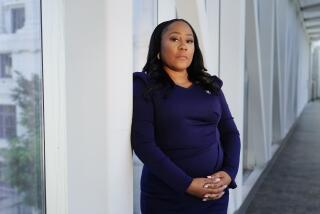Beware the Congressional Hot Seat
- Share via
The subpoena that Martha Stewart may soon receive to testify before the House Energy and Commerce Committee about alleged insider trading presents a classic double bind: No matter how she responds, she loses.
If Stewart answers questions in an effort to clear her name, her statements can be used against her in the federal criminal investigation in New York. If she asserts her privilege against self-incrimination and “takes the 5th,” she will only further damage an already wilting reputation.
While Stewart would be the most recognizable chief executive to testify before Congress in recent months, her predicament is not unusual, nor is it fair. Hearings follow a familiar headline-grabbing recipe: Demand documents, trickle out the most damaging tidbits, then subpoena executives to be grilled before a skeptical committee and, depending on the witnesses’ responsiveness, cause them to lose either a legal or a PR battle.
Congressional inquiries that parallel criminal investigations illustrate--painfully for the accused--the vast difference of purpose between the institutions. One system enforces laws while protecting individual rights, the other creates laws while protecting the public’s rights. This tension between individual rights and public policy often becomes the heart of the inquiry: Was the alleged fraud a result of the willful misconduct of a few rogue corporate executives attempting to circumvent a fundamentally sound regulatory scheme or did the system itself fail?
Proponents of such hearings point to Congress’ ability to move more swiftly and publicly than the Department of Justice or the Securities and Exchange Commission. But the emphasis on media attention and public humiliation creates a circus-like atmosphere that threatens to trample individual rights and promotes a rush-to-judgment mentality that fails to achieve the ultimate goal: getting to the truth.
As would certainly be the case with Stewart, while Congress did its work in public, the Justice Department would simultaneously conduct its investigation in private. Interviews with potential cooperating witnesses and grand jury subpoenas for documents and testimony are tools that are routinely used by prosecutors to develop facts and ultimately build a criminal case.
But the Justice Department inquiries, unlike the congressional hearings, are governed by rules of grand jury secrecy--the prosecutors and the grand jurors are barred from disclosing what occurs before the grand jury during the investigation. The rationale for this is simple: It would be unfair to disclose the investigation’s findings because the individuals involved have had no opportunity to defend against the allegations. The federal criminal justice system allows prosecutors maximum power and freedom to investigate allegations of criminality while at the same time protecting the civil liberties of those who have yet to be--and may never be--formally charged with a crime.
In contrast, the congressional inquiry is public by design. Witnesses have the choice of either publicly invoking their 5th Amendment rights against self-incrimination--and thereby drawing the very type of adverse inference against which the Constitution protects them in the criminal context--or submitting to testimony that can be later used against them in a criminal proceeding. Moreover, unlike a trial setting, those who are subpoenaed before Congress have no right to call their own witnesses, to introduce evidence or to cross-examine the testimony of others.
Congress has broad discretion to conduct fact-finding inquiries in order to ensure that the laws are fully and fairly enforced. But these hearings should not become quasi-criminal proceedings in which allegations of illegality are tossed around as sound bites.
If, as expected, Stewart becomes the latest in the list of corporate chieftains to appear before Congress, she deserves hearings aimed at influencing policy, not building a criminal case. Leave that inquiry to the prosecutors.
More to Read
Sign up for Essential California
The most important California stories and recommendations in your inbox every morning.
You may occasionally receive promotional content from the Los Angeles Times.













